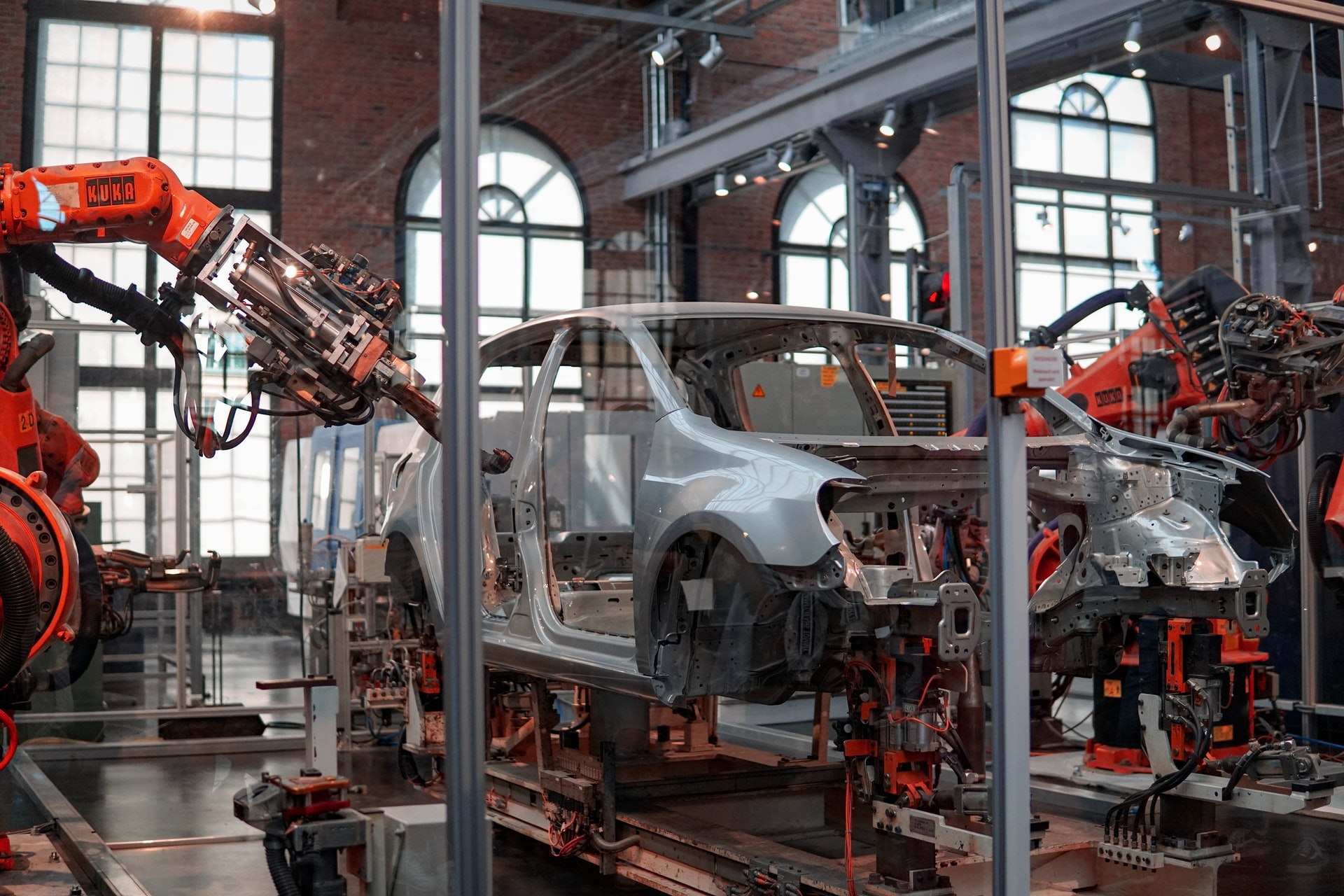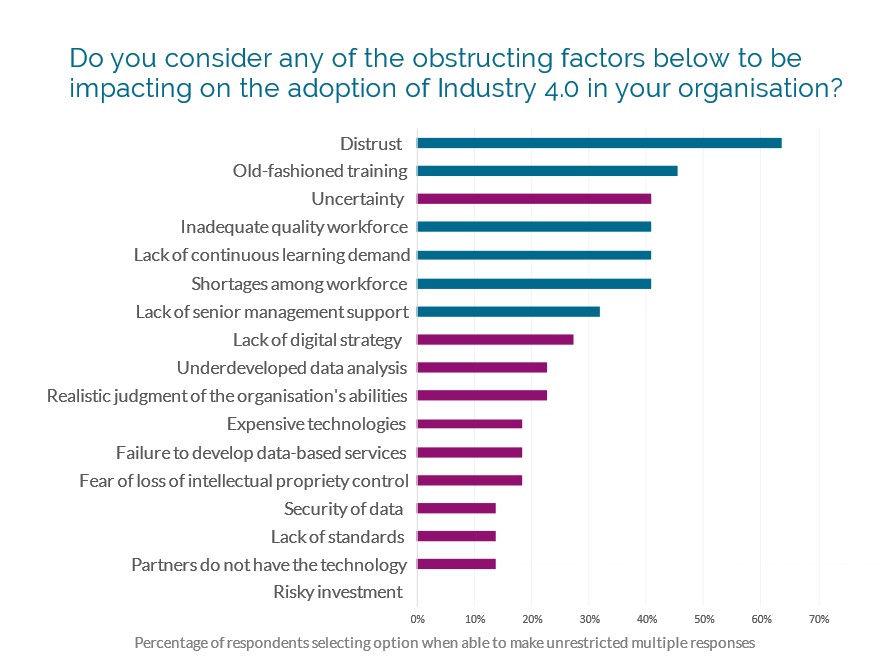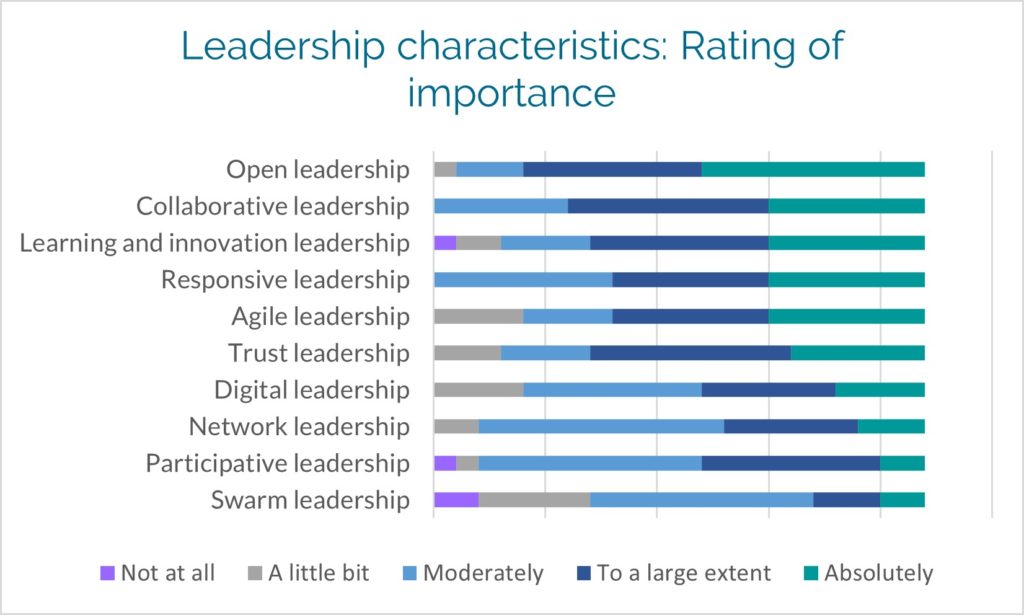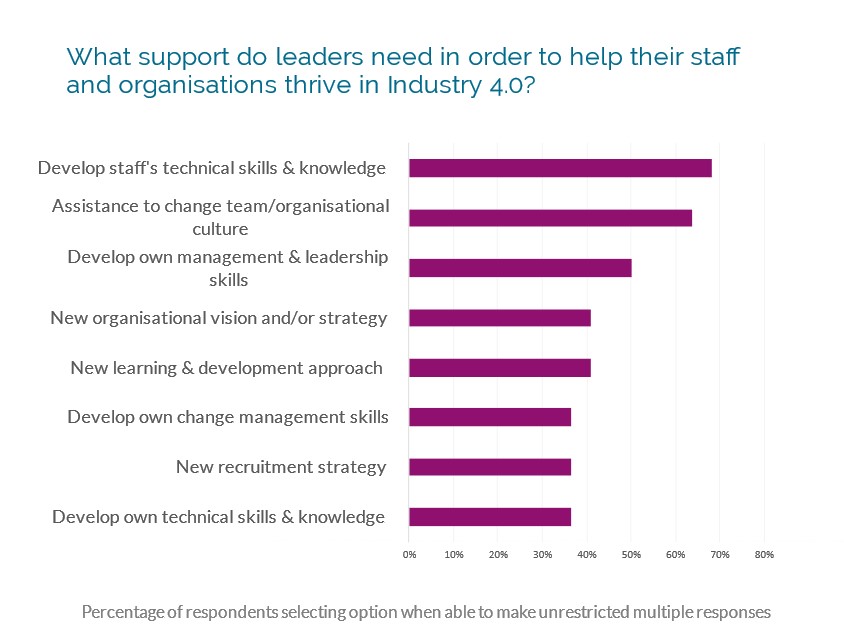Industry 4.0 is not just about technology – this preliminary research identifies 3 key challenges for Organisational Development professionals to support managers build a workforce with the right skills, knowledge and approach. Photo by Lenny Kuhne on Unsplash.
Recent years have seen such an ever-greater use of technology in manufacturing that some declare it as a ‘fourth industrial revolution’ or Industry 4.0. While multiple definitions abound, most people agree that Industry 4.0 is characterised by capturing data (using the Internet of Things) throughout a product’s journey and using that data to maximise process efficiency and meet customers’ increased expectations of bespoke solutions.
As Judit Nagy summarises, Industry 4.0 represents a revolutionary change for organisations:
- New technology (such as RFID sensors enabling real-time tracking of products and materials during the manufacturing process)
- New procedures (e.g. enhanced data analysis, machinery programming)
- New organisational capabilities (e.g. proactively providing life-long learning to support adaptation and continuous innovation)
- Potential for new business models / organisational structures (e.g. partnerships and JV)
It’s not just about technology and machinery
Industry 4.0 is often portrayed as all about technology and machinery, systems and processes. It’s even been suggested that there’s been less academic research about the human factors, which is worrying, as we should all know that whatever change you want to make, you need to focus on the people – they’re the ones who’ll make it work or not. This has been a cornerstone of change management for a long time – since at least Leavitt’s Diamond in 1972. So, as Organisational Development professionals, I think we need to be asking questions and looking for ways to help smooth the interaction between ‘technology solutions’ and ‘human resources.’
The significant opportunities and risks inherent in I4.0 make this one of the most fascinating business transitions and I am keen to better understand the needs of organisations, and of leaders in particular. As part of my visiting lecturer role at the University of Debrecen, I recently delivered a conference presentation on this subject at New Trends and Challenges in Management – Special Focus on Industry 4.0 – conference hosted by the University’s Faculty of Engineering. I’ve summarised my results below, which included a preliminary survey of managers in organisations and/or sectors affected by Industry 4.0 – though the small size and range of roles/seniority precludes any deep statistical analysis.
I’d love to hear your views – especially from managers and Organisational Development or HR professionals working in Industry 4.0 environments. Do you think that the human factors have been neglected? What are the leadership characteristics that you think are most important? How do we best support managers in I4.0 environments?
The importance of human factors
If the literature has placed less importance on human factors, we wondered how managers viewed them? We asked them a series of questions covering obstacles to Industry 4.0, how staff might react, and what support they as managers would value. In each case, it was clear that workforce issues were raised most frequently, so deserve attention.
Now this is probably influenced by perspective – the managers we asked should have had good knowledge about their teams whereas they may have not been sufficiently senior to appreciate some of the other issues we raised (e.g. financial and organisational risk factors such as ‘fear regarding loss of IP control’)
Interestingly, managers anticipated that their workforce was more likely to see the positive impacts and opportunities generated by Industry 4.0: more interesting work, career progression, making existing jobs more interesting, job enrichment and learning opportunities. Yet the highest negative potential staff reaction was ‘slow to engage with L&D’ – which could conceivably undermine all of these potential positive reactions.
When it came to obstacles, themes about staff quality, quantity and outlook ranked highly – but most telling was that ‘distrust’ was chosen by the highest number of respondents (at 64% this was almost 20 percentage points higher than the second place item). With ‘uncertainty’ also scoring highly, it suggests that managers have work to do in bridging the gap with the workforce.
Leadership characteristics for industry 4.0
Competency frameworks and leadership behaviours are used extensively for recruitment and development. While these are bespoke to each organisation, there is usually a commonality of behaviours and attitudes that are sought. However, there does not yet appear to be a consensus on the leadership characteristics required for the new approaches, dynamics and realities of Industry 4.0.
It’s worth bearing in mind Richard Kelly’s idea that for each phase of the industrial revolution there’s a dominant leadership characteristic:
- First (mechanisation): Charismatic leadership – the personal characteristics and actions of the leader drove and mobilised the organisation.
- Second (mass production): Directive leadership – more scientific management and top-down approaches became embedded.
- Third (automation & information): Relational leadership – including transformational leadership (stimulating followers to be more autonomous and creative) and transactional leadership (achievement of followers’ goals)
- Fourth (inter-connection and integration): To be confirmed? It’s suggested by Valeria Guzman that this will need to build on and surpass the transformational leadership of the Third industrial revolution; for example Saqib Shamin suggests Industry 4.0 managers will need to champion learning and innovation to a greater extent than before.
We anticipated that leadership for Industry 4.0 will cover two distinct aspects – the first around thinking skills, analytics, creativity and innovation, the second around relational, people-focused skills. Therefore we asked the managers to assess the importance of ten leadership characteristics identified by Guzman from the literature.
The results (below) were interesting – there was some consensus around the importance of these characteristics, but none were identified as clear outliers. Although 4 characteristics were deemed ‘moderately or less’ important by the majority, none of them were rated as less than moderately important.
While the sample size and scale precludes any meaningful analysis, we can say that anyone developing a leadership behaviours framework suitable for Industry 4.0 should consider aspects from all of these behaviours.
Learning & Development needs to up its game
One of the few clear messages that came through the survey was the extent to which managers consider that Learning & Development is central to the success of Industry 4.0.
When asked to consider how their staff might react to Industry 4.0, “Slow to engage with development and learning” came joint second. This could be driven by a host of conflicting supply/demand factors (e.g. quality / quantity of opportunities or workforce attitudes and expectations). However, it appears that both were similarly important – in the question about obstructing factors (see chart above) an almost equal number of managers chose ‘old-fashioned training and ‘lack of continuous learning demand’.
This was reinforced by a further question on managers’ support needs, where the greatest need identified was in developing their staff’s technical skills and knowledge – and in shifting the culture. When it comes to the manager’s own skills, it is notable that a need to improve their ‘management and leadership skills’ far outweighed change management and technical skills.
The three challenges for L&D professionals
While we must not forget the limited scope of the research sample, it appears that there is a clear challenge for L&D professionals to:
- Offer training and development opportunities that are relevant, up-to-date, attractive and effective.
- Work with managers in creating a culture of continuous learning and development.
- Develop managers’ own management and leadership skills.
It would be great to hear your views on these three challenges. Are they relevant to your situation? Have you already taken steps to address them? Are there other bigger human factors? Please comment on the article and let me know
Complete the survey
If you have time, it would be great if you could complete the survey – or share it with colleagues.
https://www.surveymonkey.co.uk/r/4thindustrialrevolution
References
Guzman, VE; Muschard, B.; Gerolamo, m.; Kohl, h.; Rozenfeld, H. Characteristics and Skills of Leadership in the Context of Industry 4.0. (2020) Procedia Manufacturing 43; 543–550
Kelly, R. Constructing leadership 4.0. Swarm Leadership and the Fourth Industrial Revolution, Palgrave Macmillan. 2018
Leavitt, H.J. Managerial Psychology. Chicago: University of Chicago Press, 1972
Nagy, J.; Oláh, J.; Erdei, E.; Máté, D.; Popp, J. The Role and Impact of Industry 4.0 and the Internet of Things on the Business Strategy of the Value Chain—The Case of Hungary Sustainability (2018), 10, 3491
Shamim, S.; Cang, S.; Yu, H.; Li, Y. Management Approaches for Industry 4.0, IEEE CEC (2016) 5309-5316Towards leadership



